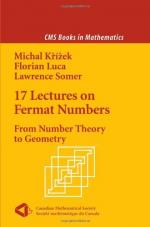|
This section contains 198 words (approx. 1 page at 300 words per page) |
Fermat numbers, named after the French mathematician Pierre de Fermat, are numbers of the form Fn= 22n+1, where n is some non-negative integer.
The first few Fermat numbers are F0=3, F1=5, F2=17, F3=257, F4=65537 and F5=4294967297 and were computed by Fermat himself, who claimed that they were all prime numbers. On this basis, he conjectured that the Fermat numbers were always prime but this turned out to be false. The Swiss mathematician Leonhard Euler showed that F5 was divisible by 641 and therefore not prime, contrary to what Fermat had claimed.
To date, no other Fermat number was found to be prime and it is known that all Fermat numbers Fn with n between 5 and 30 (and several other values of n) are composite. The current guess is that no other Fermat number beyond the first five, is prime.
A test devised by Pepin in 1877 allows the primality of a Fermat number to be tested relatively quickly on a computer, even though these numbers get huge very quickly. However, Pepin's test does not give the factors of a Fermat number when it is composite and it remains a challenge to factor the larger composite Fermat numbers.
|
This section contains 198 words (approx. 1 page at 300 words per page) |


